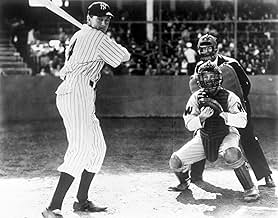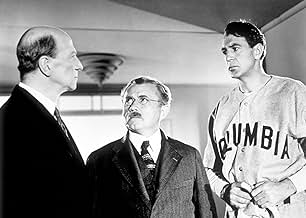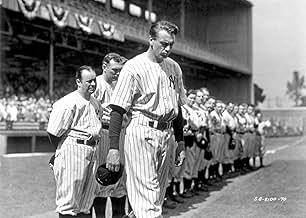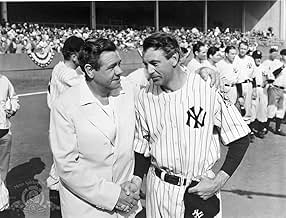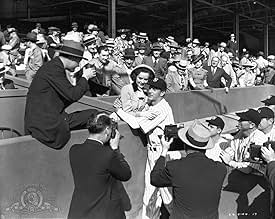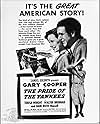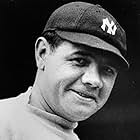The story of the life and career of famed baseball player Lou Gehrig.The story of the life and career of famed baseball player Lou Gehrig.The story of the life and career of famed baseball player Lou Gehrig.
- Won 1 Oscar
- 5 wins & 10 nominations total
Ludwig Stössel
- Pop Gehrig
- (as Ludwig Stossel)
Bob Meusel
- Robert W. Meusel
- (as Robert W. Meusel)
Featured reviews
In today's era of greedy athletes and their employers, the story of Lou Gehrig seems almost quaint. Here's a young man who by all accounts was selfless, kind-hearted, and rather introverted. And, of course, it didn't hurt that he was also a very good baseball player too. Put him on a lineup card today and he might not be the same player. Up until a few years ago, Gehrig's record of 2,130 consecutive games played was a record, a record that many thought would stand forever. For 16 years he was in the lineup as the Yankees' first baseman, never asking out for any reason. That alone should show you how special a person Gehrig was.
This biography is pretty straightforward. Unlike many of its kind, it doesn't show its protagonist somehow succeeding against all odds. Gehrig didn't have an abusive mother, he wasn't beaten up by kids at school, he wasn't learning-disabled, he didn't have attention-deficit disorder, he didn't come from abject poverty. He was simply a son in a working-class, immigrant family, as many were during the early decades of this century. And that's why Gehrig is so special to so many people - he symbolises their own hopes.
Gary Cooper is aces as Gehrig, and Teresa Wright is wonderful as his wife, Eleanor. If there's anything imperfect about the movie, it's that it is...well, a little predictable. That's something biopics can't avoid, of course, so it's no big problem. But even if most of the film doesn't impress you, the final speech at Yankee Stadium - when Gehrig was suffering visibly from the disease that would eventually be named after him - will move you past tears. And even better, when Gehrig's done his brief speech, he walks offscreen. If that movie were written today, he'd play another game and hit a game-winning home run. It's this film's honesty and sincerity that win you over.
This biography is pretty straightforward. Unlike many of its kind, it doesn't show its protagonist somehow succeeding against all odds. Gehrig didn't have an abusive mother, he wasn't beaten up by kids at school, he wasn't learning-disabled, he didn't have attention-deficit disorder, he didn't come from abject poverty. He was simply a son in a working-class, immigrant family, as many were during the early decades of this century. And that's why Gehrig is so special to so many people - he symbolises their own hopes.
Gary Cooper is aces as Gehrig, and Teresa Wright is wonderful as his wife, Eleanor. If there's anything imperfect about the movie, it's that it is...well, a little predictable. That's something biopics can't avoid, of course, so it's no big problem. But even if most of the film doesn't impress you, the final speech at Yankee Stadium - when Gehrig was suffering visibly from the disease that would eventually be named after him - will move you past tears. And even better, when Gehrig's done his brief speech, he walks offscreen. If that movie were written today, he'd play another game and hit a game-winning home run. It's this film's honesty and sincerity that win you over.
After seeing this movie, I went out and bought the Ken Burns documentary on Baseball. It's amazing how nice of a guy Lou Gherig was! He was a true gentleman. He brought his Mom to ALL THE GAMES. He was a true hero as well. I liked this movie and it was very sad to see Lou get stiff toward the end of the movie. Babe Ruth played himself and that was no hard task for him. I bought this movie it was so darn good.
A touching and emotional experience about the life of late-New York Yankees first baseman Lou Gehrig (played brilliantly by the always excellent Gary Cooper, Oscar-nominated). By 1939 Gehrig was saying farewell to baseball prematurely due to a rare muscle disorder that today bears the hero's name. Shortly after Gehrig's famous speech, he would indeed pass away. "The Pride of the Yankees" (made less than three years after his death) is a moving tribute that is first-class in every way imaginable. We meet the character as a young boy whose strict mother wants him to be an engineer. As the years pass though he cannot deny his love of the grand old game. Sportswriter Walter Brennan (who was always outstanding as well) becomes the biggest supporter of Gehrig, even though Gehrig seems out-of-place in the big city at times and seems more concerned about baseball than anything else (which bothers some inside of the Yankees circle, mainly due to Babe Ruth's famous antics). As the years pass, championships come and a constant is always Gehrig who set a record with 2,130 consecutive games played (Cal Ripken, Jr. would later break that record in 1995). He finds love with a young woman from Chicago (Oscar-nominee Teresa Wright) and it appears that happiness is all that the couple will experience. Sadly that would not be the case though. Sam Wood's heart-felt direction and a focused screenplay (which is a bit sappy at times) just add an odd element of grace that endears the film to most all movie-goers. Babe Ruth does play himself here and is a surprisingly excellent performer who allows himself to be taken out of the spotlight to tell Gehrig's story. He ends up being a really solid supporting actor. I do admit that "The Pride of the Yankees" is slightly flawed. Some things seem a bit staged (most notably the young child in the hospital), but overall the film is right on target. Anyone who loves baseball, loves movies and has feelings (whether good, bad or indifferent) about the Yankees should definitely give "The Pride of the Yankees" an at-bat. It is a stunning experience that is suitable for the whole family and teaches the whole audience about love, friendship, compassion, life, death and heroism. 4.5 out of 5 stars.
First off, my favorite actor of all time is Gary Cooper. I love his acting style, the gawkiness he often used in his screen roles, in addition of course to the fact that I thought he was absolutely gorgeous, in his prime (when he was in his 30's and 40's). Cooper's appeal is only enhanced, for me, by the distance of his on screen persona from his real-life one...he was quite the ladies' man in real life, not awkward with women as the characters he often portrayed on screen, and his smoldering sexuality shows from his piercing blue eyes. His lively offscreen affairs with stars such as Clara Bow (who famously declared "He's hung like a horse and he can go all night!"), Lupe Velez aka "The Mexican Spitfire", and of course Patricia Neal, are the stuff of old Hollywood legend.
Kevin Costner and Ralph Fiennes in their primes had nothing' on Coop. He was the man. Cooper, who started off wanting to be an artist, fell into acting instead, first as a stunt man in westerns, but quickly getting leading roles. He continued to do most of his own riding and stunts even into his later years, carving himself quite a name as a star of westerns, including the western classic "High Noon" (1952), but my favorite films of his were films such as "Mr. Deeds Goes To Town" (1936), "Meet John Doe" (1941), "Ball Of Fire" (1941), "Sargeant York" (1941), and of course "The Pride Of The Yankees". My husband understands my adoration of Gary Cooper; and/but we had this brief discussion before we watched my recently purchased DVD of the film (I'd seen it before, but didn't own a copy of it):
Husband: "I don't mind watching it with you as long as you don't make those noises you always make when you watch a Gary Cooper movie."
Me: "What noises?"
Husband: "Those noises like the ones Homer Simpson makes when he looks at a stick of butter...'Mmmmmmmm'...."
Me: "What? I didn't know I did that. Okay, I won't make any weird noises while we watch it."
So I was quiet (except for of course choking up in tears when Cooper delivers Gehrig's legendary "Today, I consider myself to be the luckiest man on the face of the earth" farewell speech). Gehrig's retirement speech helped immortalize him as a hero and an all-American role model.
"The Pride of the Yankees" is the blueprint for the sports biopic, and is generally considered to be the best movie about baseball ever made. Teresa Wright stars as his wife Eleanor. Wright, who just passed away this March, was an excellent actress, and a beautiful woman. The last film I saw her in was in a small part in "Somewhere In Time", and she had aged wonderfully. She and Cooper had great chemistry on screen, holding her own ground as he towered over her petite 5'3" frame.
Walter Brennan, a frequent Cooper co-star and real-life friend, and Babe Ruth as himself are two other co-stars who contribute much to the film.
The film traces the rags-to-riches story of Gehrig, as his childhood dream comes true when he's signed to the New York Yankees, and his untimely retirement when he is stricken with the fatal, neurological disease ALS (amyotrophic lateral sclerosis) which was afterwards simply called "Lou Gehrig's Disease". Cooper, although a bit of an odd choice for the part (one reason being his height, he was about 6'4"), gives an endearing, heartfelt, dignified performance, for which he was nominated for an Academy Award. Gehrig was left-handed, Cooper right-handed, which was further complicated by the fact that Cooper himself wasn't a capable baseball player. For the filming, his uniform had "New York" printed backwards on it, he ran to third base when he hit a ball, and then the print was reversed.
Nominated for 11 Academy Awards in all, and receiving 1 (for Film Editing), "The Pride Of The Yankees" still stands as a must-see film for baseball fans and fans of classic cinema alike.
Kevin Costner and Ralph Fiennes in their primes had nothing' on Coop. He was the man. Cooper, who started off wanting to be an artist, fell into acting instead, first as a stunt man in westerns, but quickly getting leading roles. He continued to do most of his own riding and stunts even into his later years, carving himself quite a name as a star of westerns, including the western classic "High Noon" (1952), but my favorite films of his were films such as "Mr. Deeds Goes To Town" (1936), "Meet John Doe" (1941), "Ball Of Fire" (1941), "Sargeant York" (1941), and of course "The Pride Of The Yankees". My husband understands my adoration of Gary Cooper; and/but we had this brief discussion before we watched my recently purchased DVD of the film (I'd seen it before, but didn't own a copy of it):
Husband: "I don't mind watching it with you as long as you don't make those noises you always make when you watch a Gary Cooper movie."
Me: "What noises?"
Husband: "Those noises like the ones Homer Simpson makes when he looks at a stick of butter...'Mmmmmmmm'...."
Me: "What? I didn't know I did that. Okay, I won't make any weird noises while we watch it."
So I was quiet (except for of course choking up in tears when Cooper delivers Gehrig's legendary "Today, I consider myself to be the luckiest man on the face of the earth" farewell speech). Gehrig's retirement speech helped immortalize him as a hero and an all-American role model.
"The Pride of the Yankees" is the blueprint for the sports biopic, and is generally considered to be the best movie about baseball ever made. Teresa Wright stars as his wife Eleanor. Wright, who just passed away this March, was an excellent actress, and a beautiful woman. The last film I saw her in was in a small part in "Somewhere In Time", and she had aged wonderfully. She and Cooper had great chemistry on screen, holding her own ground as he towered over her petite 5'3" frame.
Walter Brennan, a frequent Cooper co-star and real-life friend, and Babe Ruth as himself are two other co-stars who contribute much to the film.
The film traces the rags-to-riches story of Gehrig, as his childhood dream comes true when he's signed to the New York Yankees, and his untimely retirement when he is stricken with the fatal, neurological disease ALS (amyotrophic lateral sclerosis) which was afterwards simply called "Lou Gehrig's Disease". Cooper, although a bit of an odd choice for the part (one reason being his height, he was about 6'4"), gives an endearing, heartfelt, dignified performance, for which he was nominated for an Academy Award. Gehrig was left-handed, Cooper right-handed, which was further complicated by the fact that Cooper himself wasn't a capable baseball player. For the filming, his uniform had "New York" printed backwards on it, he ran to third base when he hit a ball, and then the print was reversed.
Nominated for 11 Academy Awards in all, and receiving 1 (for Film Editing), "The Pride Of The Yankees" still stands as a must-see film for baseball fans and fans of classic cinema alike.
Pride of the Yankees is still the greatest baseball movie ever made. It is the true story of the legendary Lou Gehrig, the "iron man" of baseball who was struck down suddenly by what whould later be known as Lou Gehrig's disease. Sterling performances by Cooper and a talented cast which included Thresa Wright, Walter Brennan,Dan Duryea and a guest appearance by Babe Ruth himself. There are many touching scenes in this film, especially the last one in which Gehrig says goodbye to his fans and team-mates at a tribute in Yankee Stadium. Try to rent the black and white original version. You won't be sorry!
Storyline
Did you know
- TriviaReleased just 17 months after Lou Gehrig's death.
- GoofsAs Gehrig (Cooper) is doing his homework at Columbia, he writes with his right hand. Whilst Gehrig batted and threw left-handed, like many lefties of the era (perhaps because of "correction" in school), he wrote with his right hand.
- Quotes
[last lines]
Lou Gehrig: [his farewell speech]
Lou Gehrig: Today, I consider myself the luckiest man on the face of the earth... play ball!
- Crazy creditsOpening credits acknowledgment: Appreciation is expressed for the gracious assistance of Eleanor Gehrig (as Mrs. Lou Gehrig) and for the cooperation of Ed Barrow (as Mr. Ed Barrow) and the New York Yankees arranged by Christy Walsh.
- Alternate versionsA colorized version is available.
- ConnectionsFeatured in Diamonds on the Silver Screen (1992)
- SoundtracksTake Me Out to the Ball Game
(1908) (uncredited)
Music by Albert von Tilzer
Played during the opening credits and often in the score
Details
- Runtime2 hours 8 minutes
- Color
- Aspect ratio
- 1.37 : 1
Contribute to this page
Suggest an edit or add missing content

Top Gap
By what name was The Pride of the Yankees (1942) officially released in India in English?
Answer

